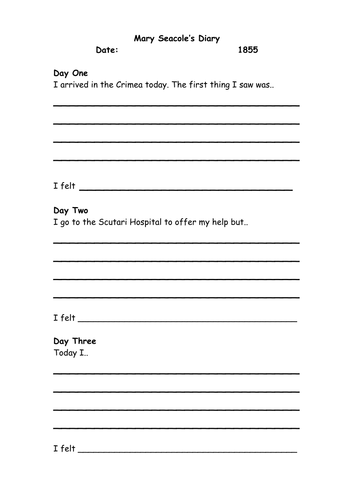




Something went wrong, please try again later.
This resource, only 1 page, is nonetheless full of factual errors. It seems to be based on the considerable amount of myth material available on her. Mrs Seacole was a fine person, but she simply did not do the things claimed for her, nor did she ever say she had. See her fine memoir, Wonderful Adventures of Mrs Seacole in Many Lands. Mary Seacole did treat people with disease, including cholera and yellow fever. But she claimed no successes with yellow fever, and limited success with cholera. On cholera she even admitted to making lamentable blunders in her remedies. That she added such toxic substances as lead acetate and mercury chloride would be good reasons for these blunders. Here she was probably no worse than many doctors of the time, but that is only to acknowledge that the effective cure for cholera and other bowel diseases had not yet been found–oral rehydration therapy, or the opposite to what mercury chloride and lead acetate would do. It is simply untrue that nobody wanted to hire her because she was black. She was three quarters white, married to a white husband, with a white business partner in the Crimea, and had a white clientele (wherever she set up shop). She ran her own businesses and did not need to be hired. She herself hired blacks. She did not have to save money to get to the Crimea. She had profits from her last business in Panama, providing for men going to the California Gold Rush. From there she went to London to see to her gold stocks (she invested while she was in Panama). She did get to the Crimea on her own, but not because she was rejected as a nurse–she was late applying, never put in the required written application. The nurses had left when she decided she wanted to go to. Her supposed hotel was a hut that served as a restuarant, bar, store, takeaway and catering service, but it was for oficers,not for soldiers. They could not have paid her prices. That she treated soldiers on the battlefield is a common exaggeration. Mrs Seacole missed the first three, major, battles of the war–busy in London on those gold stocks. There were 3 while she was there, and she did help–by giving first aid. But not while the fighting was going on. Her trips to the battlefield took place after she had served food and wine, for a price, to spectators. What she did on the battlefield was limited–no doubt she was kind, but the website exaggerates. Seacole did not seek a job as a nurse after the war, as the website states (nor did she earlier, except by informally dropping in to apply, and that too late). Officers raised money for her so that she could retire in comfort. The point that English people were not bothered about trying to learn from her medical skills or remedies seems a bit much. What medical skills? Using lead acetate and mercury chloride in remedies was not good medical practice. She did not claim to have saved lives during the Crimean War and it is a mistake to say that she did. Serving food and wine to officers, and 3 times iving first aid–kind no doubt–but not of the life saving sort.
All good, love the wordsearch, thank you
Thank you for contributing - saved me a lot of time.
Report this resourceto let us know if it violates our terms and conditions.
Our customer service team will review your report and will be in touch.
